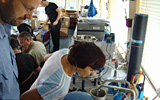JDS2 Final Results available
Danube Becoming Cleaner But More Work Needed, Says New Survey by ICPDR
Vienna, 11 September 2008 – The Danube and its tributaries are becoming cleaner, the International Commission for the Protection of the Danube River (ICPDR) announced today, presenting the scientific results of the Joint Danube Survey 2 (JDS2) - possibly the world’s biggest river research expedition ever.
“The JDS2 was a major undertaking that fulfilled its planned expectations,” said Sasa Dragin, ICPDR President and Minister for Agriculture and Water of Serbia. “It was intended to provide a good snapshot of the conditions of the Danube River and its tributaries, and it did just that.”
The findings confirm that the cooperation among Danube countries to reduce pollution is bringing positive results. Progress has been made in many areas since the Joint Danube Survey 1 of 2001. Water quality is generally improving, but more work is needed. People can swim in parts of the Danube River Basin, but not everywhere. People can eat fish without health risk, but further investigation of mercury concentrations is needed in some areas.
The Danube still contains significant natural populations of plants and animals. The first ever systematic survey of the river’s “hydromorphology” (the physical characteristics of its shape, boundaries and content) identified large areas that remain in good natural condition. Positive efforts that have been made to restore damaged natural areas, such as floodplains near Vienna and in the Danube Delta, need to continue if a good ecological condition of the river is to be achieved everywhere.
At the same time, the survey confirms that a further reduction of nutrients and organic pollution is needed. The Danube continues to show signs of degradation downstream of major cities and in a number of important tributaries because of poor municipal waste treatment. Efforts to establish waste water treatment plants in the basin, particularly in cities such as Budapest, Belgrade and Bucharest, need to be accelerated. Some countries need to intensify the pollution control efforts by industry on major tributaries. Overall, the reduction of pollution from agriculture (both nutrients and pesticides) must continue. Some toxic hot-spots also require more active attention.
Areas for further research and investigation were also identified. This includes levels of mercury in some samples, particularly in fish, as well as the sources of pollutants in some tributaries. The large number of non-native fish and other organisms in the Danube also require further assessment.
“More intensive discussions with stakeholders - such as the navigation and agriculture sectors, hydropower and the detergent industry - about measures to reduce particular pressures are needed,” says ICPDR Executive Secretary Philip Weller “The cooperative climate that exists among many stakeholders for addressing the problems needs to be maintained.”
Disclaimer
The information contained in the ICPDR website is intended to enhance public access to information about the ICPDR and the Danube River. The information is correct to the best of the knowledge of the ICPDR Secretariat. If errors are brought to our attention we will try to correct them.
The ICPDR, expert group members, nor other parties involved in preparation of information contained on this website cannot, however, be held responsible for the correctness and validity of the data and information provided, nor accept responsibility or liability for damages or losses arising directly or indirectly from the use of the information conveyed therein.
Only those documents clearly marked ICPDR documents reflect the position of the ICPDR.
Any links to other websites are provided for your convenience only. The ICPDR does not accept any responsibility for the accuracy, availability, or appropriateness to the user's purposes, of any information or services on any other website.
When using the information and material provided on this website, credit should be given to the ICPDR.

